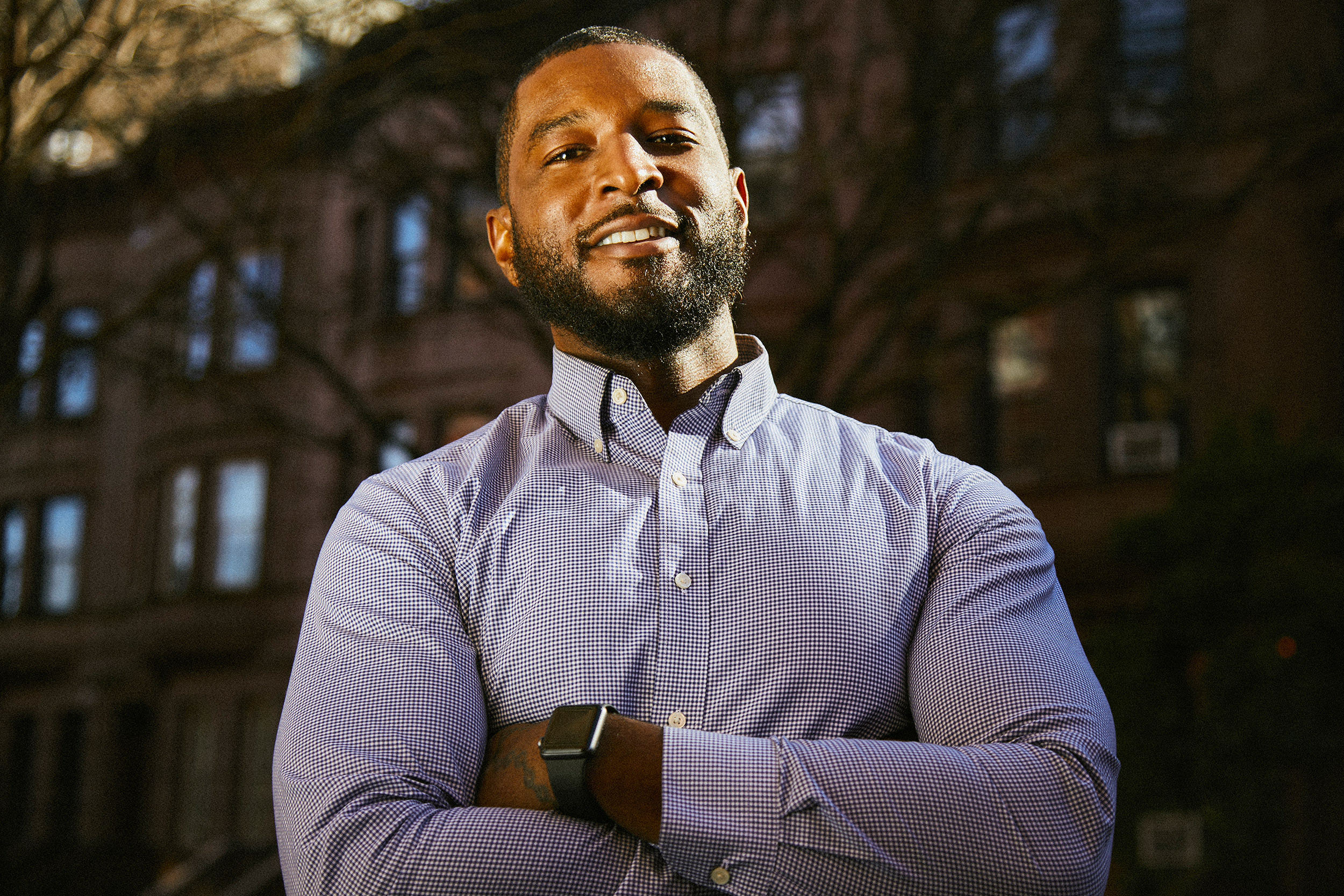
At HGSE, Steven Chambers, Ed.L.D.’21, found tools and resources that could help him identify leadership challenges and develop solutions.
Photo by Eric Hart Jr.
Building on a vision
Steven Chambers, Ed.L.D. ’21, works to make connections, close chasms, and strengthen ties
This is one in a series of profiles showcasing some of Harvard’s stellar graduates.
When the pandemic shut down schools across the country, the ability of the education system to nurture a child’s growth and development hung in the balance. Steven A. Chambers, Ed.L.D. ’21, had just started his Ed.L.D. residency at the New York City Department of Education (NYDOE), the largest school district in the country. His challenge: to work on cultivating resiliency by forging partnerships and connections across the city.
That included leading a program called the Outdoor Learning Initiative. Inspired by a New York Times article about how earlier pandemics had forced city schools to hold classes on rooftops, ferryboats, and open warehouse spaces, the initiative sought an increase in the amount of outdoor space available to schools. Classrooms were created in public parks, streets, and existing school yards. To date, 850 New York City schools have enrolled in the program, which runs through the summer.
Chambers says that schools in neighborhoods disproportionately impacted by COVID-19 and schools with no outdoor space onsite receive priority. But that meant that schools needed access to things like park permits, street closures, and even tents. Now, nearly a year into the initiative, Chambers finds himself on a call every week with major city stakeholders including the New York Mayor’s Office, the Departments of Parks and Recreation, Transportation, and Sanitation, as well as the Fire and Police Departments. His aim was to bring these major stakeholders together to find common ground and support the learning of New York City’s young people.
“I consider myself to be like a healer in that I’m passionate about helping people and communities get to the root of an issue, and I find real joy in offering resources to people to help them get to where they want to go,” says Chambers. “For me, the through line in my work has been helping people reach their maximum potential. The potential for human development and growth has always pulled on me.”
His own family had instilled in him the important role education can play in expanding opportunities and broadening horizons — an opportunity far too valuable to lose in the pandemic. His grandparents, in particular, were influential in framing his thinking around the possibilities of education. “They both came from poverty and met when they were in college, which blows my mind as they were two Black people going to college,” at that time — the late 1940s — which was uncommon, says Chambers.
“I consider myself to be like a healer in that I’m passionate about helping people and communities get to the root of an issue …”
Steven Chambers, Ed.L.D. ’21
Influenced by his family’s example of educational excellence, Chambers attended Hampton University and completed his M.Div. at Vanderbilt University. He served as a youth pastor in one of Nashville’s most underserved neighborhoods. There, he noticed the stark contrast between the access and privilege siloed in the university setting and that in surrounding communities, sparking a drive to find ways to match resources with great need and work towards true equity.
Whether a Teach For America corps member, a minister, a college adviser, or a candidate for the Texas State Board of Education, Chambers has kept this focus. Yet he often found that in his work, he was up against enormous, stagnant systems that reinforced the status quo. “I felt I was dropped into a school and a classroom that had so much need, and I did not feel equipped to close those gaps alone,” says Chambers. Now, equipped with a doctorate in education leadership from the Harvard Graduate School of Education (HGSE), Chambers continues to work on the Outdoor Initiative in New York, and is surveying what else can be done post-pandemic to best strengthen relationships inside and outside of schools — particularly those between government, community organizations, school leaders, and families — to better connect needs with resources allowing everybody a chance to grow.
At HGSE, Chambers found tools and resources, like the Immunity to Change Map developed by faculty members Robert Kegan and Lisa Lahey, that could help him identify leadership challenges and develop solutions. And while these tools helped him think about larger structural problems in the classroom, he’s found they can also deepen personal relationships and strengthen community.
“It’s been helpful especially when you’re trying to bring people together because it’s something that gives everybody a common language,” he says.
That common language around change and challenges has proved useful this year in New York. When he meets with various community stakeholders to direct resources to support learning in outdoor classrooms, what’s at stake is not just health and safety of New York City’s young people but the ability of the city to care for and nurture the next generation through this crisis. And Chambers is incredibly grateful for the ways in which the NYCDOE and other city agencies have come together to figure out how to share what they have so everybody gets what they need.
“I’ve learned a lot about negotiation, finding what works best for everyone, and realizing everyone’s best option may not be met but everybody’s needs should be met. And for me, that’s how we make this thing work,” Chambers says.
And to him, that shared sacrifice is how community is built, “That love, to me, is the key ingredient. It‘s the effort and time people put into understanding each other, the effort and the grace that we give to each other to explore how we want to grow and change.”




